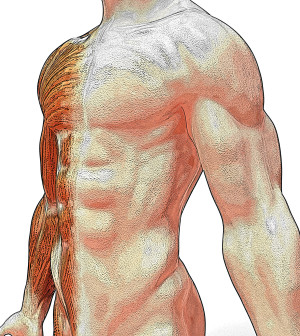- Could Your Grocery Store Meat Be Causing Recurring UTIs?
- Are You Making This Expensive Thermostat Error This Winter?
- Recognizing the Signs of Hypothyroidism
- 10 Strategies to Overcome Insomnia
- Could Artificial Sweeteners Be Aging the Brain Faster?
- Techniques for Soothing Your Nervous System
- Does the Water in Your House Smell Funny? Here’s Why
- Can a Daily Dose of Apple Cider Vinegar Actually Aid Weight Loss?
- 6 Health Beverages That Can Actually Spike Your Blood Sugar
- Treatment Options for Social Anxiety Disorder
Pride Over Weight Loss May Help Drive Anorexia


Women with the eating disorder anorexia nervosa feel a sense of pride about their weight loss, and this positive emotion may play a major role in the deadly condition, according to a new study.
“What we think happens is that positive emotions become exaggerated and are rewarding these maladaptive behaviors,” study author Edward Selby, an assistant professor in the psychology department at Rutgers University in New Brunswick, N.J., said in a university news release.
Over two weeks, the researchers assessed the emotional states of 118 women, ages 18-58, being treated for anorexia nervosa. Along with negative emotions, the women also felt positive about being able to meet or exceed their weight-loss goals.
The study was published in the July issue of the journal Clinical Psychological Science.
People with anorexia often starve themselves or exercise obsessively in order to get to a weight that’s below normal for their age and height. Without treatment, the disorder can lead to serious health problems and even death.
“Since only about one-third of women recover after treatment, what we need to do is gain a better understanding of why these positive emotions become so strongly associated with weight loss rather than with a healthy association such as family, school or relationships,” Selby said.
Most previous research into eating disorders has focused on negative emotions such as sadness, anger or lack of control. Little attention has been paid to the effects of distorted positive emotions, the researchers said.
Women in the study who had the most difficulty recognizing distorted positive emotions displayed anorexia-type behaviors — such as calorie restriction, excessive exercise, laxative use, vomiting, and frequent body fat and weight checks — more often.
“Women with anorexia are often in complex emotional places, that is why it is important to understand all we can about what they are getting out of this experience,” Selby said. “The more we know not only about the negative emotions, but also the positive emotions connected to this disease, the more likely we will be to treat this devastating illness.”
More research is needed to learn how to deal with anorexics’ positive feelings about extreme weight loss and to redirect those feelings to other healthy activities, the study says.
“Being in control is important for many of these women. What we need to do is find a way to reconnect the positive emotions they feel in losing weight to other aspects of their lives that will lead to a more balanced sense of happiness,” Selby said.
More information
The U.S. National Library of Medicine has more about eating disorders.
Source: HealthDay
Copyright © 2026 HealthDay. All rights reserved.










